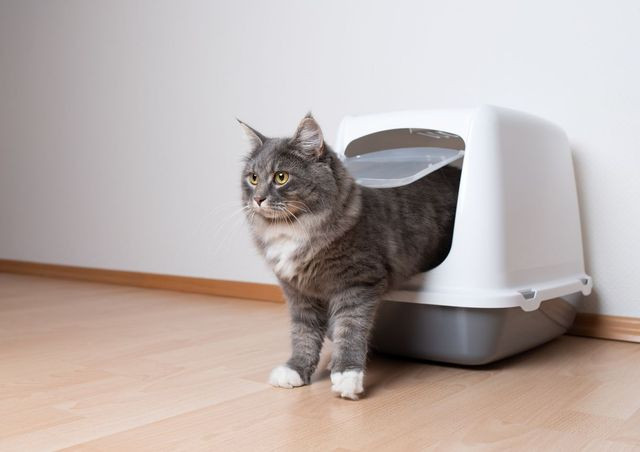 A cat stepping out of an enclosed litter box
A cat stepping out of an enclosed litter box
Discovering loose, watery stools in your cat’s litter box is an unpleasant but common experience for many pet owners. It’s essential for cat parents to be informed about feline diarrhea, also known as “Cat With The Runs,” to know how to react and when to seek professional veterinary advice. If you’ve ever pondered any of the following, keep reading:
- What are the telltale signs of diarrhea in cats?
- What could be the reasons behind your cat’s diarrhea episodes?
- When is it crucial to consult a vet for your cat’s diarrhea?
- Can diarrhea in cats be prevented?
While a brief and mild bout of diarrhea is often not alarming and can resolve itself in healthy adult cats, it’s important not to ignore it if it persists, recurs, or is accompanied by other symptoms of illness. Diarrhea in kittens or cats with pre-existing health issues also warrants careful attention.
Recognizing the Clinical Signs of Cat Diarrhea
Diarrhea in cats is characterized by loose, watery stools. However, there are several accompanying symptoms you might observe in a cat experiencing diarrhea:
- Straining during defecation: Your cat might appear to be pushing harder than usual to pass stool.
- Urgent need to defecate: They may rush to the litter box more frequently and with greater urgency.
- Increased frequency of bowel movements: You might notice more stools in the litter box than normal.
- Changes in stool volume: The volume of stool might be increased or decreased.
- Abnormal stool color: The color could be different from their usual stool.
- Presence of blood or mucus in the stool: You might notice fresh red blood or a slimy mucus coating.
Due to the increased urgency, cats with diarrhea may have accidents outside their designated litter box. Small amounts of fresh, red blood are not uncommon due to irritation in the colon or rectum.
Classifying Types of Diarrhea in Cats
Interestingly, the characteristics of your cat’s diarrhea can provide valuable clues to your veterinarian in determining the underlying cause. Diarrhea in cats can be categorized by its duration:
- Acute Diarrhea: Diarrhea that has lasted for less than 24-48 hours.
- Chronic Diarrhea: Recurring diarrhea that persists for two weeks or longer.
Diarrhea can also be further characterized by its origin in the gastrointestinal (GI) tract. It can originate from either the small bowel or the large bowel (colon). The origin can influence the symptoms and help vets narrow down potential causes.
Uncovering the Causes of Diarrhea in Cats
Diarrhea itself is a symptom, not a disease. Numerous factors can trigger diarrhea in cats, making it sometimes challenging to pinpoint the exact cause without further investigation. Some causes are relatively minor, while others can be serious. In many healthy cats, mild diarrhea is often a result of dietary indiscretion or irritation and typically resolves within a day or two.
Abrupt Dietary Changes
Cats thrive on a consistent, nutritionally balanced diet. While dietary changes are sometimes necessary, switching your cat’s food suddenly can upset their digestive system and lead to diarrhea. When transitioning to a new food, it’s best to do so gradually over 7-10 days, mixing increasing amounts of the new food with decreasing amounts of the old food.
Cats are known to be picky eaters, but their curiosity can sometimes lead to dietary indiscretion. This can include counter surfing, eating food intended for other pets, consuming table scraps, garbage, or spoiled food. These actions can easily cause stomach upset and diarrhea. Therefore, it’s crucial to keep tempting food items and garbage out of your cat’s reach, store their food properly, and always check expiration dates.
Food Allergies and Sensitivities
Just like humans, cats can develop food allergies or sensitivities to certain ingredients in their food. These sensitivities can emerge over time and affect cats of any age. Diagnosing food intolerances requires a careful approach, often involving a veterinarian-supervised elimination diet using a highly restricted food source, followed by the gradual reintroduction of individual ingredients to identify triggers. This process demands close monitoring and follow-up vet appointments to ensure your cat remains healthy and safe throughout the diagnostic period. If you suspect your cat might have food allergies or sensitivities, consulting with a veterinarian is essential to develop a proper nutritional plan.
Intestinal Parasites
Internal parasites are not always symptomatic in cats, but when they do cause symptoms, diarrhea is a common one. Common intestinal parasites in cats that can cause diarrhea include:
- Roundworms
- Hookworms
- Whipworms (less common in cats than dogs)
- Tapeworms
- Giardia
- Coccidia
- Tritrichomonas foetus
Intestinal parasites are typically diagnosed through a fecal examination. However, Dr. Jo Myers, a Vetster veterinarian, points out, “False negatives on fecal tests are common, so a negative result doesn’t completely rule out parasites.” She adds, “It’s not unusual for veterinarians to recommend a broad-spectrum dewormer initially to rule out parasites as a potential cause of gastrointestinal issues before pursuing extensive diagnostic testing.”
 A graphic of the quote above
A graphic of the quote above
Alt text: Quote from Vetster veterinarian Dr. Jo Myers stating that fecal tests can have false negatives for parasites in cats, and deworming is often recommended.
Bacterial and Viral Infections
Many infectious diseases in cats manifest diarrhea as a symptom. These infections are more prevalent in young kittens and unvaccinated cats. Other symptoms often accompany diarrhea in infectious illnesses, such as vomiting, lethargy, and fever. If your cat has diarrhea along with other symptoms, it’s crucial to see a vet to rule out bacterial or viral infections. While it’s impossible to vaccinate against every disease that can cause diarrhea, keeping your cat up-to-date on core vaccinations can prevent some of the most serious contagious diseases.
Underlying Health Conditions
Chronic or underlying health conditions can also lead to diarrhea in cats. These may include:
- Inflammatory Bowel Disease (IBD)
- Hyperthyroidism
- Pancreatitis
- Liver disease
- Kidney disease
- Certain types of cancer
Identifying these underlying conditions often requires diagnostic tests such as fecal analysis, bloodwork, urinalysis, and imaging (X-rays or ultrasound). Diagnosing chronic illnesses can sometimes involve repeated testing at different labs, which can be complex for pet owners to navigate. If you need clarification or assistance in understanding your cat’s test results, a veterinarian or veterinary technician can provide valuable guidance.
Medication Side Effects
Certain over-the-counter and prescription medications can have diarrhea as a side effect. Cats can react differently to medications, so it’s not always predictable whether a medication will cause diarrhea. Before starting your cat on a new medication, discuss potential side effects with your veterinarian and understand what steps to take if your cat experiences them.
When to Seek Veterinary Care for Your Cat’s Diarrhea
For healthy adult cats, mild diarrhea without other symptoms may resolve on its own within 24-48 hours. However, it’s important to seek veterinary attention promptly in the following situations:
- Diarrhea lasting longer than 24 hours.
- Diarrhea accompanied by other symptoms such as vomiting, lethargy, loss of appetite, or fever.
- If your cat has a pre-existing health condition.
- Presence of digested blood (dark, tarry stools) or a large amount of fresh blood in the stool.
- Severe diarrhea in a young kitten.
After consulting with a veterinarian, you can support your cat at home in several ways. Ensure they have access to plenty of fresh, clean water to prevent dehydration. Your vet may recommend fasting your cat for a short period (always under veterinary guidance), feeding a bland diet (like boiled chicken and rice), or making dietary adjustments. Never fast a cat without veterinary direction, as it can be harmful. Veterinarian-approved anti-diarrheal medications might also be prescribed to help alleviate symptoms. Never administer any medication to your cat without your vet’s approval.
Preventing Diarrhea in Your Cat
While diarrhea can be a symptom of many conditions and isn’t always preventable, cat owners can take steps to minimize potential causes. Avoid sudden changes in your cat’s diet and refrain from giving them table scraps. Keep other food items and tempting non-food items, such as houseplants and garbage, out of their reach. Maintain up-to-date parasite prevention and vaccinations, and discuss potential medication side effects with your vet. Regular wellness exams and veterinary check-ups can help detect underlying conditions early, before symptoms like diarrhea even appear. If your cat is experiencing diarrhea or if you have any concerns about the causes of diarrhea in cats, consider scheduling a virtual consultation with a Vetster online veterinarian to discuss your cat’s health.
FAQ: Key Questions About Cat Diarrhea Answered
What is a good home remedy for cat diarrhea?
For mild diarrhea in an otherwise healthy adult cat, it may resolve on its own within 24 hours. Ensure your cat has access to plenty of fresh water to prevent dehydration. Placing extra litter boxes around the house can help minimize accidents. Do not fast your cat, change their diet, or give medications without your vet’s advice.
When should I worry about my cat’s diarrhea?
While a mild case of diarrhea can be common and resolve on its own in healthy adult cats, it’s important to consult a vet if diarrhea persists beyond 24 hours, is accompanied by other symptoms, or occurs in kittens or cats with health issues. A small amount of fresh blood can be normal due to irritation, but large amounts of fresh blood or digested blood in the stool is an emergency.
What are common causes for diarrhea in cats?
Diarrhea is a symptom of various conditions. Common causes in cats include sudden diet changes, dietary indiscretion (eating inappropriate things), food allergies or sensitivities, viral or bacterial infections, parasitic infections, and medication side effects.
Is diarrhea in kittens serious?
Yes, diarrhea in kittens is particularly concerning. Kittens are more vulnerable to serious infectious diseases, and dehydration from diarrhea can develop rapidly and become life-threatening. Seek immediate veterinary care if your kitten has severe diarrhea or diarrhea lasting over 24 hours.
Why pet parents love Vetster
Book virtual vet appointments 24/7
Access expert pet care from anywhere
Choose from thousands of top-rated vets
Meet our vets
Get better vet care & meet with a vet in just minutes.
Talk to a vet
Related posts
[  New Puppy Guide: A companion resource for your dog’s first year of life – A small white puppy galivanting through a field
New Puppy Guide: A companion resource for your dog’s first year of life – A small white puppy galivanting through a field
New Puppy Guide: A companion resource for your dog’s first year of life
Becoming a pet parent is a big responsibility, and if you’ve never owned a dog before — or even if you have and it’s been a while! — you likely have many questions when it comes to ensuring your puppy feels happy, safe, and comfortable in their new space.
](https://vetster.com/en/wellness/vetster-lifestages-guide-puppy)
Alt text: Energetic white puppy running joyfully through a green field, representing puppy care resources.
[  What to do if my dog has arthritis – An older-looking small dog walking on the sidewalk, with out-of-focus fallen leaves in the foreground.
What to do if my dog has arthritis – An older-looking small dog walking on the sidewalk, with out-of-focus fallen leaves in the foreground.
What to do if my dog has arthritis
Arthritis is a joint disease that causes joint pain and mobility issues in dogs. The condition is often managed using multiple treatment methods at once.
](https://vetster.com/en/wellness/what-to-do-if-my-dog-has-arthritis)
Alt text: Senior dog with graying fur walking slowly on a sidewalk covered with fallen leaves, symbolizing canine arthritis.
[  What to do if my puppy’s eyes suddenly get cloudy – Golden puppy runs along the beach during fog
What to do if my puppy’s eyes suddenly get cloudy – Golden puppy runs along the beach during fog
What to do if my puppy’s eyes suddenly get cloudy
Puppies can get cloudy eyes for many reasons. Talking to a vet is important to get an accurate diagnosis and proper treatment to avoid vision loss and eye damage.
](https://vetster.com/en/wellness/what-to-do-if-my-puppy-s-eyes-suddenly-get-cloudy)
Alt text: Golden retriever puppy running on a foggy beach, representing the topic of cloudy eyes in puppies and the need for veterinary care.

